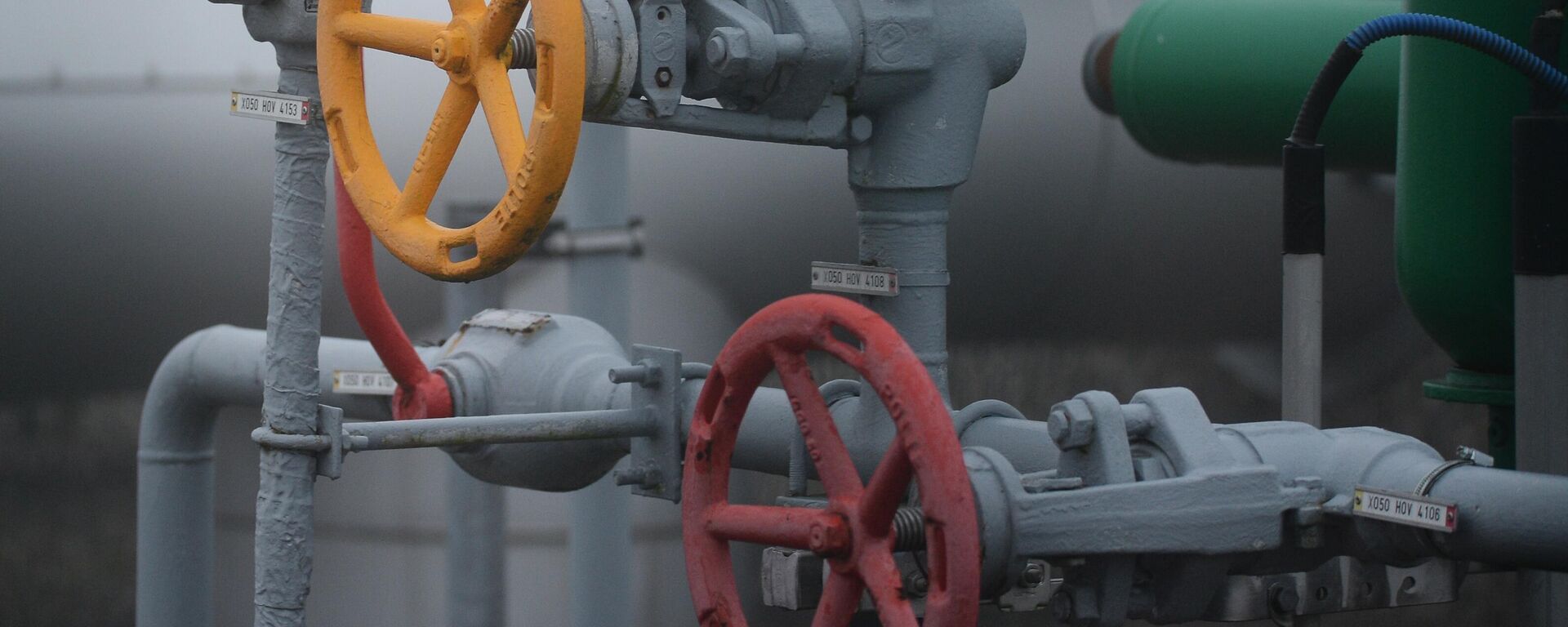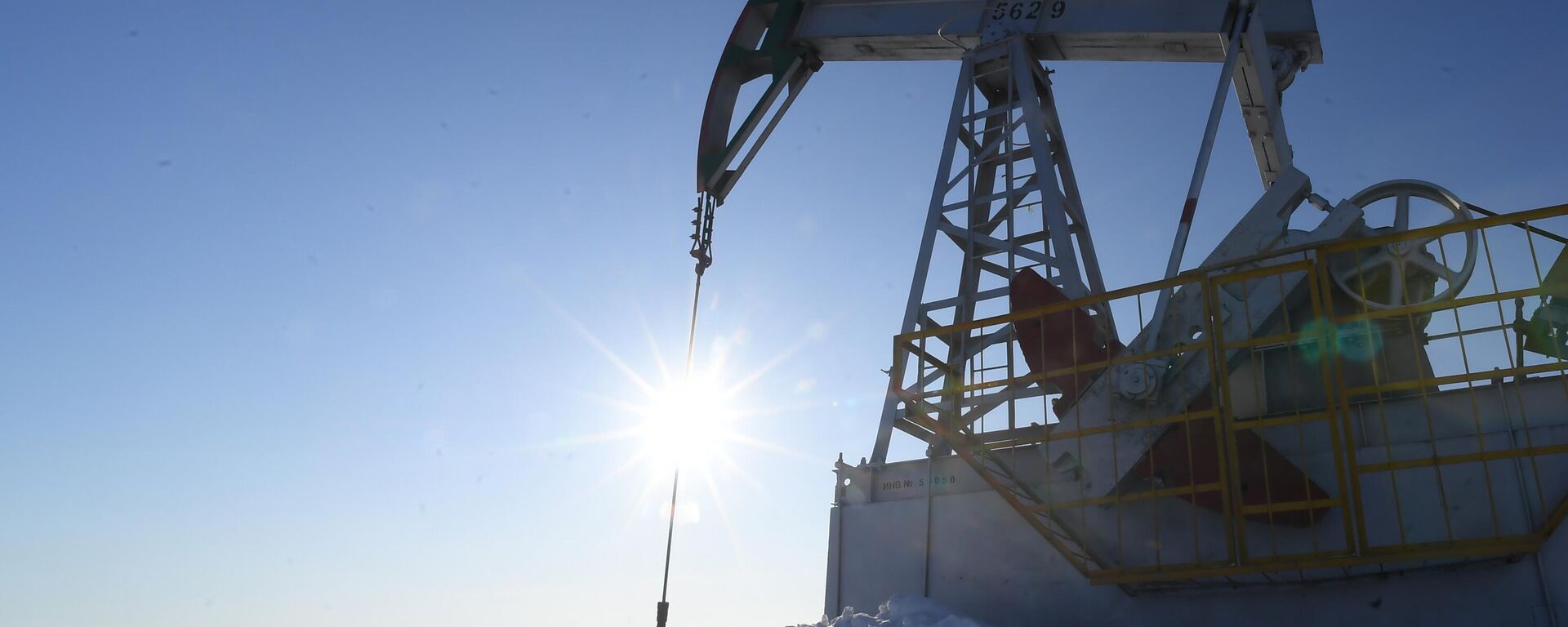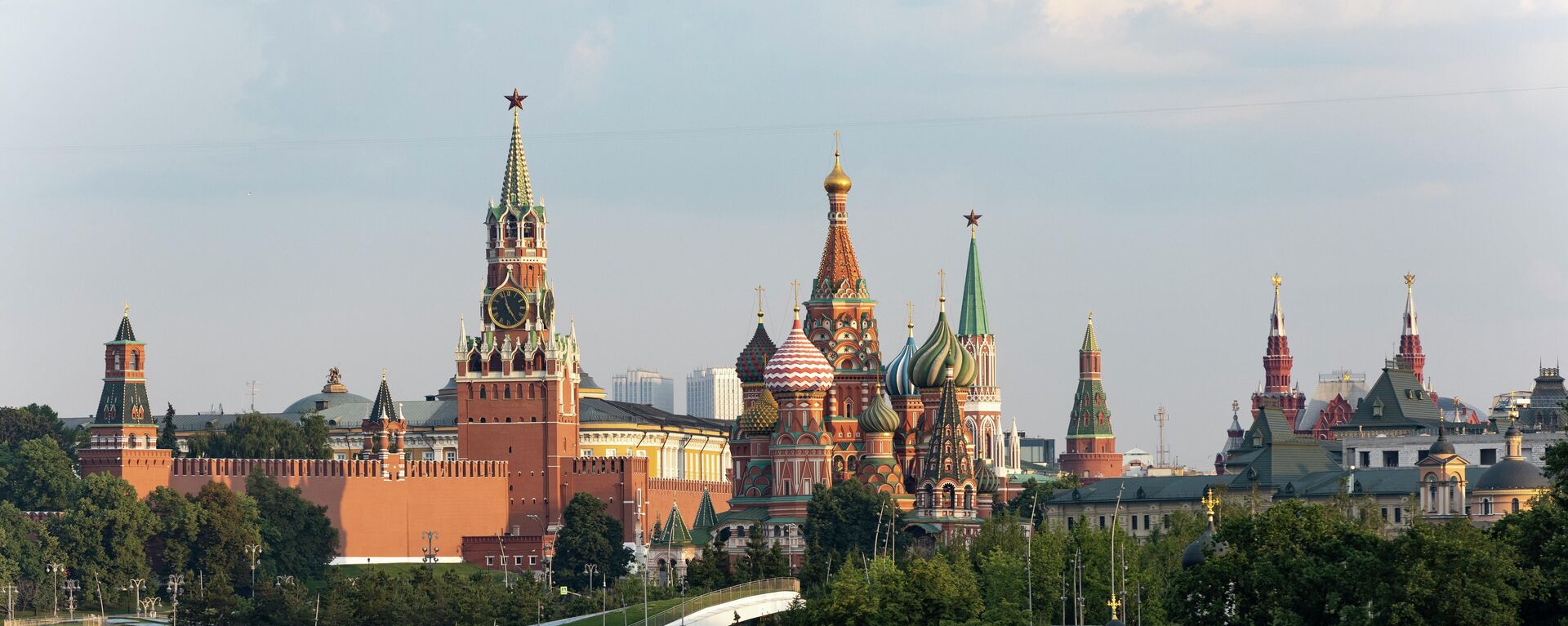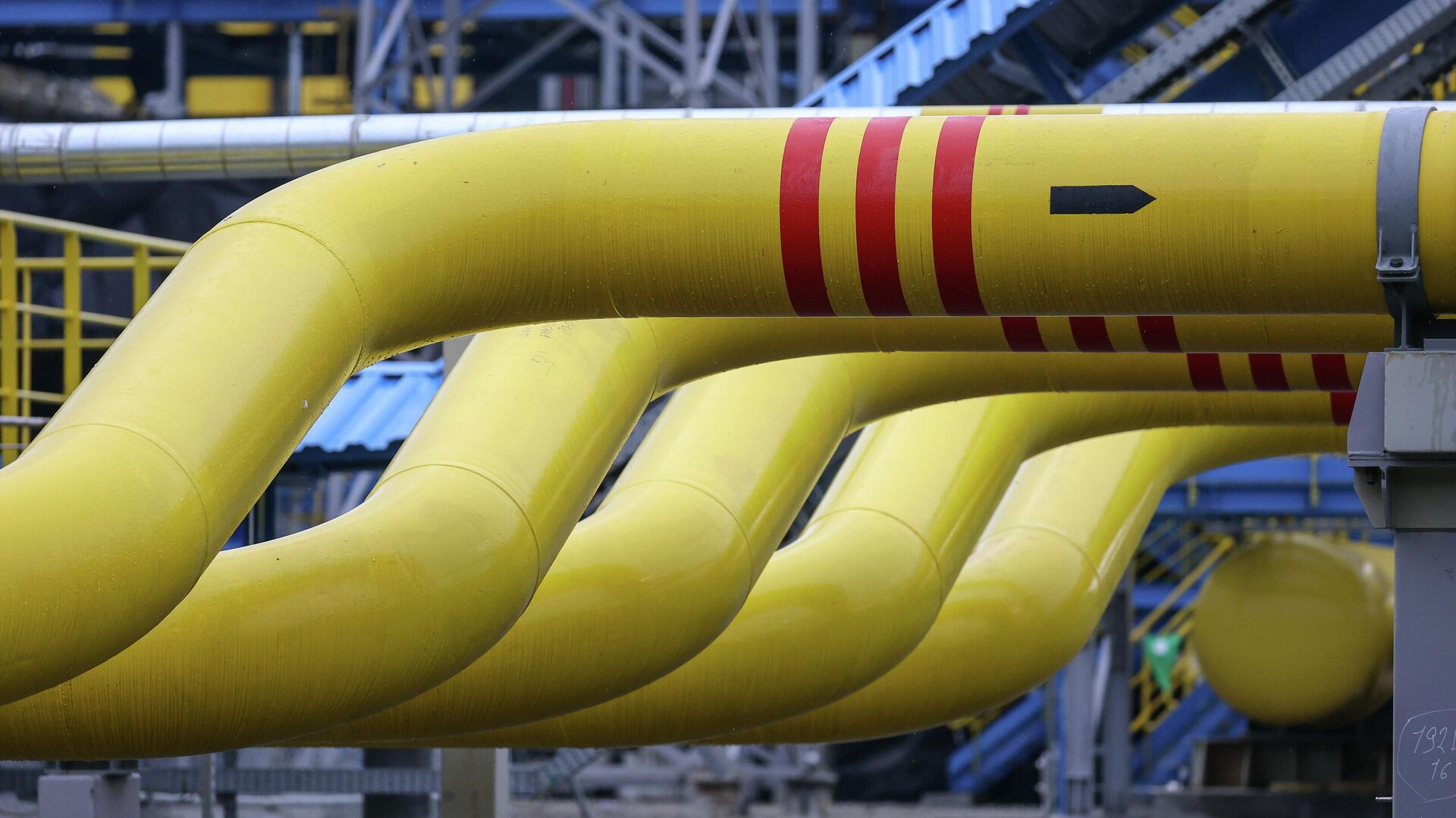https://sputnikglobe.com/20231206/eu-overpaid-185-bln-for-gas-due-to-russia-sanctions--1115419103.html
EU 'Overpaid' €185 Bln for Gas Due to Russia Sanctions
EU 'Overpaid' €185 Bln for Gas Due to Russia Sanctions
Sputnik International
European Union has been forced to overpay 185 billion euros for gas imports since it imposed sanctions on Russia over Ukraine.
2023-12-06T06:44+0000
2023-12-06T06:44+0000
2023-12-06T11:50+0000
european union (eu)
liquefied natural gas (lng)
ukraine
moscow
russia
eurostat
sanctions
gas
world
mikhail mishustin
https://cdn1.img.sputnikglobe.com/img/07e6/09/10/1100842069_0:229:3234:2048_1920x0_80_0_0_1e5b2deb0088603799830fca22398ad3.jpg
The European Union has been forced to overpay some €185 billion for gas imports since it imposed self-harming sanctions against Russia over Ukraine, according to Sputnik's calculations based on Eurostat data.Since February 2022, when Brussels first started to levy restrictions on Moscow, the EU's average monthly gas import expenditures have risen to €15.2 billion. Of this, €7.7 billion has been spent on liquefied natural gas (LNG), while the remaining €7.5 billion has gone to pipeline gas. Meanwhile, during the year before the introduction of sanctions, European countries paid an average of €5.9 billion for gas (€3.6 billion for pipeline gas; €2.3 billion for liquefied gas).Thus, it is estimated that EU member states over the course of 20 months spent a total of €304 billion on gas imports, while previously such expenses were accrued over several years. For example, from April 2017 to the end of 2021, the EU spent €186 billion on gas imports, and from 2013 to 2021 the value of such imports was at €292 billion.While Europe has been reeling from the fallout from the backfiring sanctions, the United States has been raking in profits estimated to be worth €53 billion. Other countries that have benefited from the EU’s struggle to find alternatives to Russian energy are the UK (€27 billion), Norway (€24 billion), and Algeria (€21 billion).Russia, on the other hand, despite the reduction in supply volumes, has received an additional €14 billion due to surging prices. The EU’s shortsighted crusade to limit Moscow’s energy-related income has resulted in Qatar earning the same amount – an additional €14 billion, while Azerbaijan brought in a bonus worth €12 billion. A look at some of the other beneficiaries of this EU gas policy revision shows that Angola banked €5 billion, Egypt - €4 billion, and Trinidad and Tobago - €3 billion. An additional €2 billion were received by Nigeria and Cameroon, and another billion each by Libya, Oman and Equatorial Guinea. Another 12 countries earned relatively small sums, totaling almost €2 billion.Before the Ukraine crisis and the sanctions unleashed against Moscow over its special military operation in the neighboring country, Europe received approximately 40 percent of the gas it consumed from Russia. Ever since the Ukraine conflict escalated, Brussels has been cobbling together package after package of sanctions targeting Russia. However, to anyone with a clear understanding of the energy needs of the 27-member bloc, it was evident that it was backing itself into a corner by opting to “wean itself” off Russian gas. The Ukraine conflagration and the punitive restrictions have led to disruptions of supply chains and a surge in energy prices worldwide. Furthermore, the Nord Stream pipeline sabotage added to the continent's woes.Western countries and their allies were left facing an energy crisis and struggling to fill their gas reserves. Overall, the sanctions have triggered in the West everything from raging inflation, recession fears, to looming deindustrialization, with Germany being hit the hardest..At the same time, oil and gas revenues of the Russian budget have been significantly outpacing those of the last year since September despite external pressure, Russian Prime Minister Mikhail Mishustin said earlier in the autumn.Furthermore, the World Bank reported in August that by the end of 2022, Russia's wealth in purchasing power parity (PPP) terms had exceeded $5 trillion for the first time — putting it ahead of Western Europe's three biggest economies, namely, France, financial giant the United Kingdom, and industrial powerhouse Germany.
https://sputnikglobe.com/20231111/european-countries-still-supplied-with-russian-gas---russias-gazprom-ceo-1114891762.html
https://sputnikglobe.com/20230908/russian-budgets-non-oil-gas-revenues-in-august-up-by-565-year-on-year-1113198588.html
https://sputnikglobe.com/20230817/russia-grows-richer-while-west-bleeds-trillions-amid-failed-sanctions--funding-ukraine-1112666650.html
ukraine
moscow
russia
Sputnik International
feedback@sputniknews.com
+74956456601
MIA „Rossiya Segodnya“
2023
News
en_EN
Sputnik International
feedback@sputniknews.com
+74956456601
MIA „Rossiya Segodnya“
Sputnik International
feedback@sputniknews.com
+74956456601
MIA „Rossiya Segodnya“
european union gas imports, eu overpaid for gas imports, self-harming sanctions on russia over ukraine, us lng exports
european union gas imports, eu overpaid for gas imports, self-harming sanctions on russia over ukraine, us lng exports
EU 'Overpaid' €185 Bln for Gas Due to Russia Sanctions
06:44 GMT 06.12.2023 (Updated: 11:50 GMT 06.12.2023) Disruption of Russian gas supplies due to Western sanctions on Moscow over Ukraine have left Europe grappling with spiraling inflation and surging energy bills, with the costs of liquefied natural gas (LNG) exports from the US adding to the pressures on European households’ budgets.
The European Union has been forced to overpay some
€185 billion for gas imports since it imposed
self-harming sanctions against Russia over Ukraine, according to
Sputnik's calculations based on
Eurostat data.
Since February 2022, when Brussels first started to
levy restrictions on Moscow, the EU's average monthly gas import expenditures have risen to €15.2 billion. Of this,
€7.7 billion has been spent on liquefied natural gas (LNG), while the remaining
€7.5 billion has gone to pipeline gas. Meanwhile, during the year before the introduction of sanctions, European countries paid an average of
€5.9 billion for gas (€3.6 billion for pipeline gas; €2.3 billion for liquefied gas).
Thus, it is estimated that EU member states over the course of 20 months spent a total of €304 billion on gas imports, while previously such expenses were accrued over several years. For example, from April 2017 to the end of 2021, the EU spent €186 billion on gas imports, and from 2013 to 2021 the value of such imports was at €292 billion.
While Europe has been reeling from the fallout from the
backfiring sanctions, the United States has been raking in profits estimated to be worth €53 billion. Other countries that have benefited from the EU’s struggle to find alternatives to
Russian energy are the UK (€27 billion), Norway (€24 billion), and Algeria (€21 billion).

11 November 2023, 17:43 GMT
Russia, on the other hand, despite the reduction in supply volumes, has received an additional €14 billion due to surging prices. The EU’s shortsighted crusade to limit Moscow’s energy-related income has resulted in Qatar earning the same amount – an additional €14 billion, while Azerbaijan brought in a bonus worth €12 billion. A look at some of the other beneficiaries of this EU gas policy revision shows that Angola banked €5 billion, Egypt - €4 billion, and Trinidad and Tobago - €3 billion. An additional €2 billion were received by Nigeria and Cameroon, and another billion each by Libya, Oman and Equatorial Guinea. Another 12 countries earned relatively small sums, totaling almost €2 billion.
Before the
Ukraine crisis and the sanctions unleashed against Moscow over its special military operation in the neighboring country, Europe received approximately 40 percent of the gas it consumed from Russia. Ever since the Ukraine conflict escalated, Brussels has been cobbling together package after package of sanctions targeting Russia. However, to anyone with a clear understanding of the energy needs of the 27-member bloc, it was evident that it was backing itself into a corner by opting to “wean itself” off Russian gas. The Ukraine conflagration and the punitive restrictions have led to disruptions of supply chains and a surge in energy prices worldwide. Furthermore, the
Nord Stream pipeline sabotage added to the continent's woes.
The Nord Stream pipelines, built to deliver gas under the Baltic Sea from Russia to Germany, were hit by explosions on September 26, 2022. Denmark, Germany, and Sweden left Russia out of their investigations into the attack, prompting Moscow to launch its own probe with charges of international terrorism. In the absence of any official results so far, Pulitzer Prize-winning US investigative journalist Seymour Hersh published a report in February 2023 alleging that the blasts were organized by the US with Norway's support. Washington has denied any involvement.
Western countries and their allies were left facing an
energy crisis and struggling to fill their gas reserves. Overall, the sanctions have triggered in the West everything from raging inflation, recession fears, to looming deindustrialization, with
Germany being hit the hardest..

8 September 2023, 10:12 GMT
At the same time,
oil and gas revenues of the Russian budget have been
significantly outpacing those of the last year since September despite external pressure, Russian Prime Minister Mikhail Mishustin said earlier in the autumn.
Furthermore, the World Bank reported in August that by the end of 2022, Russia's wealth in purchasing power parity (PPP) terms had exceeded $5 trillion for the first time —
putting it ahead of Western Europe's three biggest economies, namely, France, financial giant the United Kingdom, and industrial powerhouse Germany.

17 August 2023, 11:09 GMT







